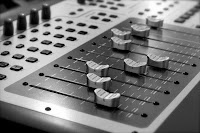1. Don't over-EQ when mixing. In general, mastering engineers can do a better job for you if your mix is on the dull side rather than too bright. Likewise, better to be light on the bottom end than have too much.
2. Don’t over-compress when mixing. You might as well not even master if you’ve squashed it too much already. Hypercompression deprives the mastering engineer of one of his major abilities to help your project. Squash it for your friends and squash it for your clients, but leave some dynamics for your mastering engineer.
3. Come prepared. Make sure all documentation and sequencing is complete before you get there. You’ll make it easier on yourself and your mastering person if everything is well documented, and you’ll save yourself some money too. Be sure to include shipping instructions and record company identification numbers, and if your songs reside on hard disc as files, make sure that each file is properly ID'd for easy identification (especially if you’re not there during the session).
4. Check your phase when mixing. It can be a real shock when you get to the mastering studio and the engineer begins to check for mono compatibility and the lead singer disappears from the mix because something is out-of-phase. Even though this was more of a problem in the days of vinyl and AM radio, it’s still an important point since many so-called stereo sources such as television are either pseudo-stereo or only stereo some of the time. Check it and fix it if necessary before you get there.
5. Go to the mastering session if possible. Most engineers and producers will go to the first few sessions when checking out a new mastering engineer to see if he has the same musical and technical sensibilities. After that, a bond of trust develops and they will simply send the mix master with any instructions. That being said, you should go to all of the mastering sessions if possible because it will always sound a bit different (and hopefully better) than what it sounded like during mix-down. Attending the session also allows for some final creative decisions that only you can make ("The kick is a little loud, see if you can de-emphasize it a bit," or "Let's squash the whole mix a little more to make this tune punchier").
6. If you’re making a vinyl record or CD, known the song sequence. Sequencing (the order that the tunes appear on the CD or vinyl record) is especially important and making this list beforehand will save you money in mastering time. Many engineer/producers have the mistaken impression that once the final mix is finished, it's off to the mastering studio. There needs to be one additional session, known as the "sequencing session," where you do any editing that’s required (it’s cheaper to do in your own DAW than during mastering) and listen to the various sequence possibilities. This is really important if you’ll be releasing in multiple formats such as CD and vinyl or different countries or territories, since they may require a different song order due to the two sides of the record.
7. Have your songs timed out. If your project is going to be released on CD or vinyl, you want to make sure that your project can fit. Most CD's have a total time of just under 80 minutes (78:33 to be exact) although it’s possible to get an extended time CD (be careful, you may have replication problems). Obviously the available time decreases if you choose to include additional files on the ROM section of the disc. Cumulative time is important when mastering for vinyl because the mastering engineer must know the total time per side before he starts cutting due to the physical limitations of the disc. This is about 25 minutes per side if you want the record to be nice and loud.
8. Don’t be afraid to ask for help. If you’re unsure of the amount of compression or EQ that you’re applying while you’re mixing, send the mastering engineer a mix of a song and ask for his opinion. He can guide you on what you got right and what you got wrong so that when you finally deliver the master to him, the mixes sound their best. Believe it or not, mastering engineers love to do this because it makes their job a lot easier in the long run.
For additional tips and tricks or to read other excerpts, check out the excerpt section on bobbyowsinski.com.
----------------------------------
You should follow me on Twitter for daily news and updates on production and the music business.
Don't forget to check out my Music 3.0 blog for tips and tricks on navigating social media and the new music business.



2 comments:
Sage advice, sir.
Cheers
This was helpful, thanks!
Post a Comment